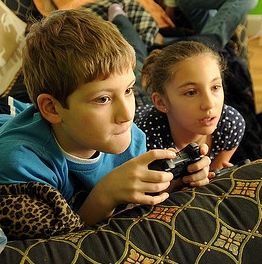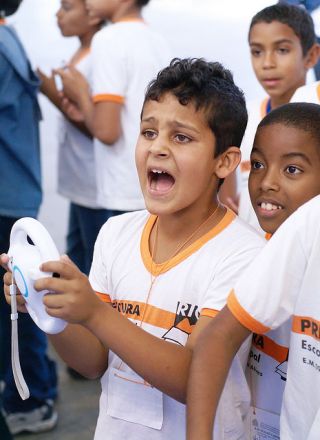Anger
The Truth About Violent Video Games and Kids, Part 1
How violent video games do—and do not—affect children.
Posted September 14, 2015 Reviewed by Devon Frye

The American Psychological Association (APA) has released a new 2015 report on violent video games. Based on a thorough review of recent studies, the report concludes: “The research demonstrates a consistent relation between violent video game use and heightened aggressive behavior, aggressive cognitions, and aggressive affect and reduced prosocial behavior, empathy, and sensitivity to aggression.”
But what does this conclusion mean for parents? Let’s talk first about what the APA conclusion does NOT mean.
What the Research DOESN’T Say
The APA research review does NOT mean that violent video games are the biggest or even a major cause of aggression. Other factors, such as family violence, having an anger-prone personality, poverty, harsh parental discipline, peer rejection, and school problems, are established risk factors for aggression.
It does NOT mean that video games always cause aggressive thoughts, feelings, and behavior, instantly, in every child. Although the bulk of studies do find a small link between violent video games and some sort of aggression, there are plenty of studies that fail to find this association or find it only under certain circumstances or for certain people.
It definitely does NOT mean that all kids who play violent video games will turn into mass murderers.
Few parents are worried about their kids becoming violent criminals. The more relevant question for most parents is, “Will playing violent video games make my kid more likely to shove a classmate, squabble with a sibling, or be sassy to me?” The answer is maybe, but not necessarily.
A Clinical Perspective
As a clinician, I know that transfer of behavior from one situation to another doesn’t necessarily happen easily. If only kids would automatically do the things that they practice with me in my office when they’re with their peers or family members, my work would be so much easier! Children routinely behave differently in different situations: They act differently with mom versus dad, at school versus home, with friends versus siblings, and so on. So I don’t expect that violent behavior in a video game will automatically transfer to violent behavior offline.
On the other hand, I also know that how children feel and think affects how they act. Standard cognitive-behavioral treatments for anger or aggression problems involve helping kids learn to calm their bodies, interpret others’ actions in less hostile ways, and practice peaceful ways of handling conflicts. To the extent that violent video games affect children’s moods, arousal, or ways of thinking about other people—and there’s plenty of evidence that they do—they could grease the skids towards real-life aggression, particularly in kids who aren’t so good at reining in aggressive impulses.
A Closer Look at the Evidence
Online comments from fans of violent video games typically argue, “I’ve played hundreds of hours of violent video games and haven’t murdered anyone!” But a lack of felonies doesn’t mean violent video games have no effect. Anyone who has ever felt excited, tense, or frustrated while playing a video game has been “affected” by them. Whether that translates into meaningful real-life outcomes is the issue.
Debate among researchers about the effects of violent video games has been surprisingly contentious, with one side accusing the other of trying to incite “moral panic,” the other side describing the psychological reasons underlying “denial” of the effects of violent video games, and both sides claiming to be more empirically rigorous than thou. What’s even more surprising is that researchers on both sides of this controversy generally agree that the size of effects of violent video games on thoughts, feelings, or behavior is “small” when aggregated across studies. They disagree about how important these effects are.
Reading the different review articles and individual studies about violent video games can seem a bit like watching a ping pong game pitting sets of findings against counter-findings.
Scientists who are convinced that violent video games do have meaningful negative effects point out that numerous experimental studies, using various methodologies, have demonstrated a link between playing violent video games and aggression (see Bushman & Huesmann, 2014). For obvious ethical reasons, researchers can’t let anyone get hurt, so laboratory measures of aggressive behavior tend to involve things such as assessing how much hot sauce participants choose to put in a salsa taste test for an imaginary person who doesn’t like spicy foods or how loud of a noise blast they choose to “punish” an imaginary competitor.
Skeptics note that not all studies find that playing violent video games leads to an increase in these types of laboratory measure of aggression, and they also question the whether these measures have anything to do with real-life behavior (see Elson & Ferguson, 2013).
Those who are convinced of the negative effects of violent video games counter with evidence about the validity of the measures and insist that the preponderance of experimental studies, as well as longitudinal studies looking at reports of actual aggression, establish, “beyond a reasonable doubt,” a connection between violent video games and aggression (see Warburton, 2014).

Skeptics counter that the observed effects may not be caused by violence. They point out that violent video games are often more challenging, faster paced, and more competitive than nonviolent video games. Paul Adachi and Teena Wiloughby (2011) found that it was competitiveness of video games, rather than how violent they were, that predicted later aggressive behavior in their studies. Struggling with a game can lead to frustration and aggression, whether or not the game is violent.
How Long Do the Effects Last?
If any negative effects of playing violent video games disappear quickly, then they may not be important. Research by Christopher Barlett and his colleagues (Barlett, Branch, Rodeheffer, & Harris, 2009) shows that the effects of violent video games on aggressive feelings and aggressive thoughts fade within four minutes, and their impact on heart rate and aggressive behavior can last five to ten minutes.
However, other studies show that playing violent video games leads to more aggressive thoughts, feelings, and behavior 24 hours later in college men who ruminated about the game (Bushman & Gibson, 2011). The effects of violent video games may also be cumulative. College students who played violent video games for just 20 minutes, three days in a row, showed increasingly aggressive behavior and hostile expectations compared to people who played nonviolent games (Hasan et al, 2012).
Most of the experimental studies about violent video games involve college students, but there are some studies following children or teens over extended time periods that show a link between violent video game play and later aggression. A three-year longitudinal study involving children in third through eighth grades in Singapore found that playing more violent video games was linked to more aggressive thoughts one year later, which was linked to more self-reported aggressive behavior (Gentile, Li, et al. 2014). Another longitudinal study of high school students found that playing more “action” or fighting video games—but not nonviolent video games—predicted increasing aggression over the four years of high school (Willoughby, Adachi, & Good, 2012).
Do Violent Video Games Teach Kids Not to Care?
Some researchers argue that playing violent video games can desensitize children to violence, reduce their empathy for victims, increase their beliefs in the acceptability of violence, and encourage moral disengagement (e.g., Bastian, Jetten, & Radke, 2012; Bushman & Anderson, 2009; Funk, 2003; Hartmann & Vorderer, 2010).
For instance, in one study involving college students, participants played either a violent or nonviolent video game for 20 minutes then watched a 10-minute video featuring real-life violence involving actual courtroom outbursts, police confrontations, shootings, and prison fights. Those who had played a violent game showed less physiological response to the video of real violence (Carnagey, Anderson, & Bushman, 2007; see also Engelhardt et al., 2011).
However, emergency room physicians no doubt become somewhat desensitized to blood and guts, yet I doubt they are more prone to aggressive actions or less likely to help someone who is hurt than other people are. Also, being less fazed by grizzly pictures or a video of real violence doesn’t necessarily mean people would be unaffected by an actual person in front of them getting hurt.
The effects of violent video games may depend on who is playing them and under what circumstances. Patrick and Charlotte Markey (2010) argue that people with a personality constellation of being 1) easily upset (high neuroticism); 2) showing little concern for other people’s feelings (low agreeableness); and 3) having a tendency to break rules or act without thinking (low conscientiousness) are particularly susceptible to the negative effects of violent video games. Identifying with a violent character (Konijn, Bijvank, & Bushman, 2007) or getting a “double dose” of violence from family conflict as well as media exposure (Fikkers et al., 2013) may also increase the negative impact of violent video games.
On the other hand, there’s also some research showing that playing violent video games as a team (which is how most kids play) makes people behave in more cooperative ways afterwards, compared to people who play the game alone (Greitemeyer et al., 2012). For instance, a lot of my teen clients (mostly boys) talk about Clash of Clans. This game is certainly violent—in that there are cartoon-style swords, arrows, and lots of explosions—but their attraction to the game isn’t the violence; it’s the strategizing and teamwork with friends.
In Part 2 of this post I’ll talk about why violent video games appeal to kids and what all of this research means for parents.
Related Posts
The Truth About Violent Video Games and Kids, Part 2
Helping the “Bad Kid” of the Family
Growing Friendships blog posts are for general educational purposes only. They may or may not be relevant for your particular situation. You’re welcome to link to this post, but please don’t reproduce it without written permission from the author.
© Eileen Kennedy-Moore, Ph.D.
References
Adachi, P. J. C. & Willoughby, T. (2011). The effect of video game competition and violence on aggressive behavior: Which characteristic has the greatest influence? 4, 259-274.
American Psychological Association (2015). Report on the Review of the Violent Video Game Literature. http://www.apa.org/news/press/releases/2015/08/violent-video-games.pdf
Barlett C., Branch, O., Rodeheffer, C., & Harris, R. (2009). How long do the short-term violent video game effects last? Aggressive Behavior, 35, 225-236.
Bushman, B. J. & Huesmann, L. R. (2014). Twenty-five years of research on violence in digital games and aggression: A reply to Elson and Ferguson (2013). European Psychologist, 19, 47-55.
Elson, M. & Ferguson, C. (2014). Twenty-five years of research on violence in digital games and aggression: Empirical evidence, perspectives, and a debate gone astray. European Psychologist, 19, 33-46.
Fikkers, K. N., Piotrowski, J. T., Weeda, W. D., Vosse, H. G. M., & Valkenburg, P. M. (2013). Double dose: High family conflict enhances the effect of media violence exposure on adolescents’ aggression. Societies, 3, 280-292.
Gentile, D. A., Li, D., Khoo, A., Prot, S., & Anderson, C. a. (2014). Mediators and moderators of long-term effects of violent video games on aggressive behavior: Practic, Thinking, and action, JAMA Pediatrics, 168, 450-457.
Greitemeyer, T., Traut-Mattausch, E., & Osswald, S. (2012). How to ameliorate negative effects of violent video games on cooperation: Play it cooperatively in a team. Computers in Human Behavior, 28, 1465-1470.
Hasan, Y., Bègue, L., Scharkow, M., & Bushman, B. (2012). The more you play, the more aggressive you become: A long-term experimental study of cumulative violent video game effects on hostile expectations and aggressive behavior. Journal of Experimental Social Psychology, 49, 224-227.
Konijn, E., A., Bijvank, M. N., & Bushman, B J. (2007). I wish I were a warrior: The role of wishful identification in the effects of violent video games on aggression in adolescents. Developmental Psychology, 43, 1038-1044.
Markey, P. M. & Markey, C. M. (2010). Vulnerability to violent video games: A review and integration of personality research. Review of General Psychology, 14, 82-91.
Willoughby, T., Adachi, P. J. C., & Good, M. (2012). A longitudinal study of the association between violent video game play and aggression among adolescents. Developmental Psychology, 48, 1044-1057.
Warburton, W. (2014). Apples, oranges, and the burden of proof—Putting media findings into context: A comment on Elson and Ferguson (2013). European Psychologist, 19, 60-67.




